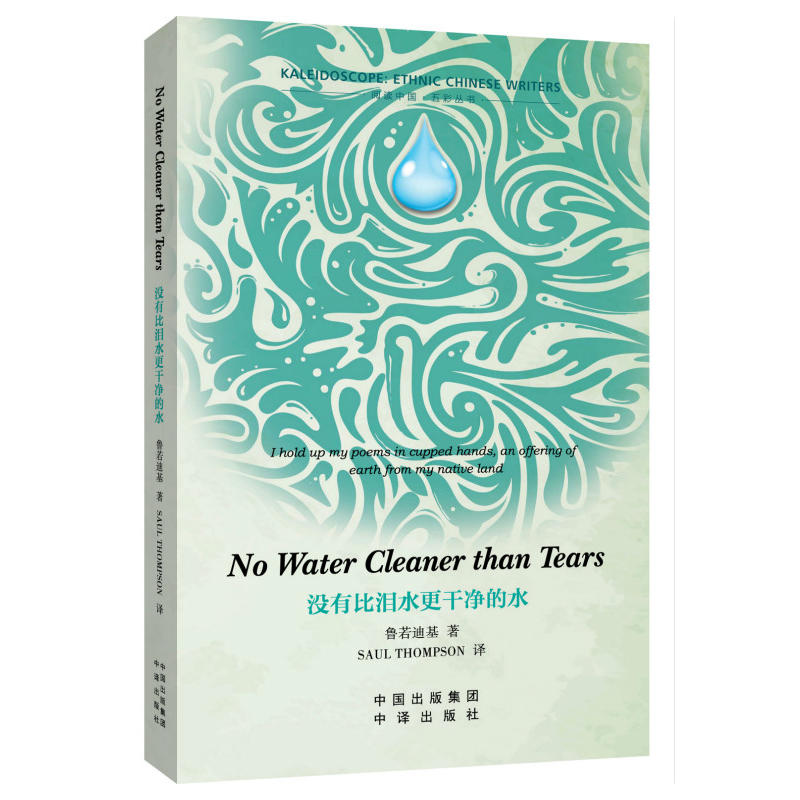
4.2分
包邮没有比泪水更干净的水

温馨提示:5折以下图书主要为出版社尾货,大部分为全新(有塑封/无塑封),个别图书品相8-9成新、切口有划线标记、光盘等附件不全详细品相说明>>
- ISBN:9787500151500
- 装帧:80g胶版纸
- 册数:暂无
- 重量:暂无
- 开本:32开
- 页数:165
- 出版时间:2017-06-01
- 条形码:9787500151500 ; 978-7-5001-5150-0
本书特色
“在云南红土高原的西北,有绵延千里的小凉山,奔腾喧嚣的金沙江,直剌青天的玉龙雪山,还有美丽动人的泸沽湖。我就出生在那片神奇美丽的土地上。” 诗人来自普米族,一个只有三万多人的民族,他的家在云南小凉山脉的斯布炯山下、泸沽湖边的一个叫果流的村庄里,他的父亲是茶马古道上的赶马人,他的母亲是果流村里的“女王”,“她会唱的民歌如星星一样多”。他说,他是那片土地上千万个孩子中zui普通的一个。他还说,作为行吟在那片土地上的歌者,他是幸运的宠儿。他幸运,是因为他深深爱着的那片神奇美丽的土地给了他生命,也给了他诗篇。 “I was born on Yunnan province’s high, red earth plateau, where the Little Liang Mountains stretch far into the north western distance. Here, the pounding Jinsha river thunders through gorges, the Yulong Snow Mountain pierces heaven, and here also is beautiful Lugu Lake, whose waters stir deep currents in all those who look on her.” This poet’s People is a small one; the Pumi ethnicity numbers only around thirty thousand people in total. His home is a village named Guoliu, which nestles beneath Mount Sibujiong in the Little Liang Mountain range, at the edge of Lugu Lake. His father drives horse caravans along the ancient ‘Tea Horse Road’, a trade route between horse-rich Tibet and Yunnan’s tea-producing jungle regions. The poet introduces his mother as the Queen of Guoliu village, a lady feted for her ability to sing more Pumi folk-songs than there are stars in the sky. Luruo says he is a completely ordinary child of his land, just one among many others like him. He also calls himself a child of fortune – for him, it is a great blessing to make a livelihoods composing verse in his native place. The fount of his good fortune is the ethereal vitality of the land that he so loves, and which has given him life, and poems. Yunnan poet Luruo Diji writes in beautifully arranged Mandarin Chinese, but his poetry has its source on the distant periphery of the Chinese cultural world; his poems take form in the red earth of the high plateau, in the lofty borderlands of southwest China, a region moulded by unrestrained acts of nature. His People, the Pumi ethnic minority, are long-time residents of a unique natural landscape bordering both th e Himalaya Mountains and deep sub-tropical jungles, home to giant snow-mountains and steep gorges, where the upper reaches of the Yangzi River rage and thunder. Many of the poems in this book take place among these great natural formations, dipping in and out of stories of the people that live there, the impressions they left on the land for a moment. Luruo often presents his poems as material pieces of his homeland, the fine earth crumblings of the land’s inspiration passed through his hands, laid on the page. This collection is an emotional tribute to one of China’s most stunning wildernesses, by one of its children.
内容简介
民族文化并非凝固不变,它会随着时代的发展而不断丰富。在文学中坚守的“民族性”,不是狭隘的“民族主义”或“地方主义”,而是以世界的眼光、时代的眼光不断发掘民族传统文化的精华。
目录
作者简介
鲁若迪基,普米族,1967年生于云南省宁蒗县。曾获全国少数民族文学创作“骏马奖”、《人民文学》优秀诗歌奖、首届汉语诗歌双年十佳奖、第三届华语文学传媒大奖年度诗人提名奖等。 Luruo Diji is a writer of the Pumi ethnicity. He hails from Ninglang county in Yunnan province, where he was born in 1967. His prizes and awards include: the Jun Ma prize for literature by ethnic minority writers, the People’s Literature magazine prize for outstanding poetry, the prize for Chinese language poetry in its inaugural year, and the nomination prize for poets at the third session of the annual Grand prize for Chinese Literature and Media, among others.
-

小妇人(纯英文)/床头灯英语.3000词读物
¥6.4¥15.8 -

英文滑稽诗300首:英汉对照
¥12.3¥42.0 -

名著名译英汉对照读本马克.吐温短篇小说选
¥10.5¥28.0 -

英语六级词汇背诵精典 高教版
¥19.9¥89.8 -

你往何处去
¥12.2¥33.0 -

MADAME BOVARY-包法利夫人
¥10.9¥36.8 -

浮生六记(汉英对照)
¥18.6¥65.0 -

柳林风声
¥10.9¥29.0 -

爱丽丝漫游奇境
¥3.1¥6.0 -

THE GREAT GATSBY-了不起的盖茨比
¥6.7¥16.8 -

了不起的盖茨比(纯英文)/床头灯英语.3000词读物
¥5.5¥12.8 -

三曹诗选英译
¥14.3¥38.0 -

小王子-法文朗读原版
¥7.8¥20.0 -

牛津高阶英汉双解词典-第8版
¥148.0¥299.0 -

夜莺与玫瑰-全2册
¥12.3¥29.8 -

英诗选译-孙大雨译文集-(英汉对照)
¥13.2¥36.0 -

威克菲尔德的牧师-(英语原著版.第三辑)
¥5.2¥12.0 -

新概念英语一课一练 1
¥13.2¥19.0 -

双语名著无障碍阅读名著丛书---纳尼亚传奇
¥16.7¥49.0 -

怦然心动(共2册)(汉英)
¥40.0¥65.0














